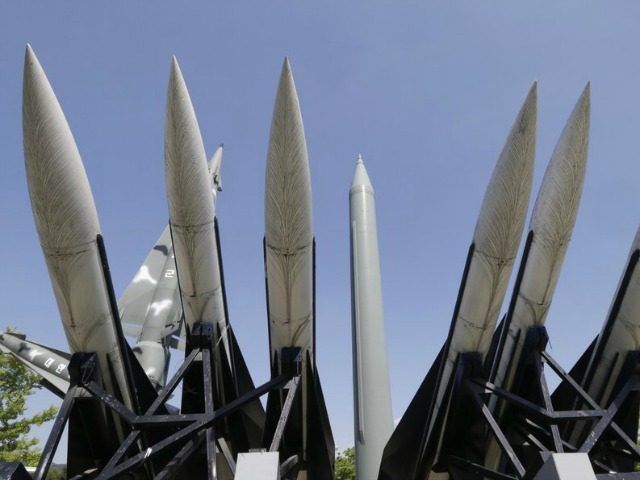Defense Intelligence Agency Director Lieutenant-General Vincent Stewart told senators at an Armed Services Committee hearing Tuesday that North Korea is currently on an “inevitable” path to acquiring a nuclear missile that can hit the United States.
Stewart urged senators to help the U.S. government on its mission to change the international status quo such that a nuclear-armed North Korea would no longer be a foregone conclusion.
“Let me be very clear on this point, if left on his current trajectory, [the Kim] regime will ultimately succeed in fielding a nuclear armed missile capable of threatening the United States homeland,” Stewart told the senators. “While nearly impossible to predict when this capability will be operational, the North Korean regime is committed and is on a pathway where this capability is inevitable.”
Dan Coats, director of National Intelligence, was also at the hearing and added that North Korea’s leadership “believes its regime’s survival is dependent solely on becoming a nuclear power,” hence the emphasis on creating a nuclear arsenal.
The two did not limit their observation that nuclear weapons development is seen as a path to long-term stability to the North Korean regime. Stewart added that China, too, appears to be seeking to modernize its nuclear arsenal. “Certainly nuclear weapons and modernization of their nuclear force is an integral part” of Chinese development, he argued. “All of these countries view nuclear weapons as the guarantor of their regime, it’s much like North Korea.”
“So China continues to modernize all levels, including nuclear forces, including capability to deter U.S. forces from entering the Western Pacific. They don’t talk about a first use, but they do talk about use of nuclear weapons as part of war fighting,” he added.
China, a longtime ally of the North Korean regime, has recently begun implementing United States sanctions against Pyongyang and increasingly condemned dictator Kim Jong-un for refusing to abide by international law. At the Chinese Foreign Ministry’s regular press conference on Tuesday, spokeswoman Hua Chunying told reporters, “China has always fully and strictly implemented the relevant UNSC [Security Council] resolutions in their entirety” and emphasized any trade with North Korea was done “on the prerequisite of not violating the resolutions.”
The North Korean regime has conducted five nuclear weapons tests and has rejected all efforts by the international community to deter its development of such a weapon. Given North Korea’s diplomatic ties to other rogue regimes – including Syria, Cuba, Iran, and Venezuela – the possibility of them possessing a nuclear weapon poses a global existential threat.
During the weekend, North Korea tested a medium-range missile with potential nuclear capability, which would not be able to reach the U.S. mainland but endangers allies in east Asia. The missile reportedly flew 310 miles, which places Japan and South Korea in the line of fire. The South Korean Joint Chiefs of Staff issued a statement that the country was “keeping a full military readiness.”
America’s U.N. Ambassador Nikki Haley responded to the latest missile test, reminding the world that, for America, “all options are on the table” regarding containing North Korea as a global threat and warning North Korea that “we don’t want to start a fight, so don’t give us a reason to have one.”
The United States is facing a complex situation in the region as South Korea adopts a leftist, soft-line stance against Pyongyang. Newly elected president Moon Jae-in has called for dialogue with Kim, vowing to travel to Pyongyang personally if he felt it would improve the situation and requesting Vatican intervention in the matter. (Moon is the nation’s second Roman Catholic president.) Moon appears to be shifting to a more centrist stance on North Korea, however, stating last week that he would “sternly deal with the North, together with the international community.”
In addition to collaboration with China, Japan, and North Korea, a report Tuesday suggested that President Donald Trump has recruited Philippines President Rodrigo Duterte to participate in efforts to keep the North Korean threat at bay. Trump reportedly told Duterte the United States was keeping “a lot of firepower over there” in case Kim, “a madman with nuclear weapons,” chose to attack a regional ally.
Duterte, according to a transcript released by the Philippine government, agreed with Trump that Kim’s “mind is not working and he might just go crazy one moment.”

COMMENTS
Please let us know if you're having issues with commenting.